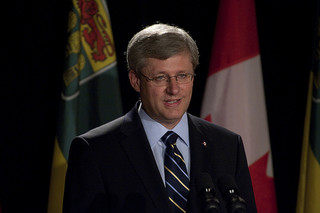“The time for accountability has arrived.”
These were the first words written by Stephen Harper in the Conservatives’ 2006 election platform, “Stand Up for Canada.” Indeed, if there is an animating theme in what would become the Conservatives’ winning election message in 2006, it was the Tories’ insistence that they would inaugurate an era of transparent and accountable government that would “replace old-style politics with a new vision.”
Among the proposals designed to restore accountability and transparency to government, the Tories promised to:
1. “Clean up the procurement of government contracts.”
2. “Ensure truth in budgeting.”
3. “Provide real protection for whistleblowers.”
4. “Strengthen Access to Information legislation.”
5. “Strengthen auditing and accountability within departments.”
Given that Treasury Board President Tony Clement has recently extolled his government’s record of transparency and accountability at the April “Open Government Partnership,” it is perhaps an opportune time to see how well those 2006 Tory election promises have held up.
Let’s begin at the top — how has that clean-up of government contracts been coming along? Ah yes, there is that little incident with the $9-billion F-35 fighter jet procurement. Or was it $15 billion? Or $25 billion? Or $28.5 billion? We don’t really know, because parliament was kept in the dark over the true costs of the F-35 purchase. In the wake of the scathing auditor general’s report on the procurement process, Public Works Minister Rona Ambrose announced that “funding will remain frozen and Canada will not purchase new aircraft until further due diligence, oversight and transparency is applied to the process of replacing the Canadian Forces’ aging CF-18 fleet.” Apparently the clean-up is a work in progress…
How about “truth in budgeting?” Surely the Conservatives, as paragons of fiscal probity, have accomplished this worthy election promise? Well, there was that historic censure motion that found the Harper Conservatives in contempt of parliament for their refusal to disclose accurate costs of the crime bill, corporate tax cuts and… fighter jets.
Protection of whistleblowers? In yet another scathing indictment by an auditor general, Sheila Fraser concluded that the government’s whistleblower watchdog failed to perform its mandated functions, showing great reluctance to accept or investigate cases, with only seven of 228 complaints investigated during the watchdog’s three-and-a-half year tenure.
Strengthen Access to Information? For two years in a row, Canadian Journalists for Free Expression gave the Prime Minister’s government the lowest grade possible — an F minus — citing longer delays in responding to information requests, releasing less information, for politicizing the access system with attempts to “unrelease” documents already released, and for being in contempt of Parliament for failing to provide information on spending programs.
Finally, how about “strengthening auditing and accountability within departments”? We could just refer you back to promise number one. But to show the Department of Defence is in good company, we could also cite the G8 Legacy Infrastructure Fund, the Canada Employment Insurance Financing Board, and pretty much every other government department.
Not what you would call a stellar record of openness and transparency over the past six years. So it is all the more astonishing, given this proven track record of secrecy, obstruction and concealment, that the Harper government feels it has the moral authority to chastise others on the need for more disclosure and transparency. Bill 377 — which singles out trade unions alone for a host of onerous and costly public reporting and disclosure requirements that dues-paying union members already have access to — is currently making its way through parliament as a private member’s bill. From the evidence above, perhaps the government should get its own house in order before it starts lecturing others on the merits of transparency and accountability.
Simon Enoch is Director of the Saskatchewan Office of the Canadian Centre for Policy Alternatives. He holds a PhD in Communication and Culture from Ryerson University in Toronto. This article was first posted on Behind the Numbers.




